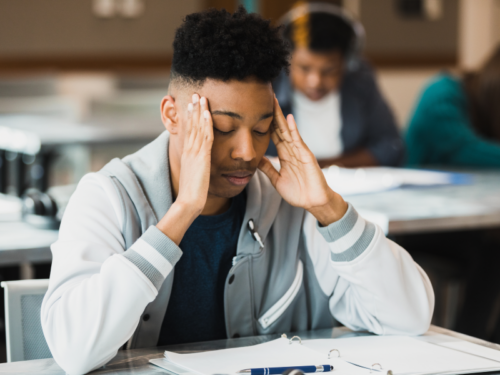
Table of Contents
Mental Health Tips for High School Students, According to Therapists

Written By: Ashley Laderer

Clinically Reviewed By: Dr. Don Gasparini
September 15, 2023
9 min.
If you’re a high school student struggling with depression, anxiety, or self-harm, you are not alone. Read on for therapist-recommended tips for coping with these struggles during high school.
Learn more about our Clinical Review Process
Table of Contents
High school and mental health can both be challenging to deal with. Put them together, and you have a doubly intense set of obstacles. Academic pressures to perform well, neverending homework, expectations from parents, and figuring out your identity are all a lot to handle, especially when dealing with mental health conditions like depression, anxiety, or self-harm.
However, it’s essential to remember that you’re not alone in this journey. About half of teens have dealt with a mental health condition, data shows. That means chances are some of your classmates are struggling, too—whether or not they are open about it.
If you’re wondering, “What are some tips for high school and mental health?” look no further. We asked a couple of therapists for tips on managing high school and mental health, and this is the advice they gave, including tips for dealing with depression, anxiety, and self-harm. Keep in mind: these tips don’t replace going to therapy. In fact, these tips are more likely to work when you use them along with help from a mental health professional.
Tips for coping with depression in high school
Data from the National Institute of Mental Health (NIMH) shows that around 20% of middle school and high school students ages 12 to 17 have experienced a depressive episode. Depression can make it very difficult to enjoy high school or even make it hard to complete the simplest tasks. If you are a high school student dealing with depression, follow these tips for managing depression in high school.
Avoid isolation
Depression and isolation often go hand in hand. Isolation can fuel depression, and depression can make you want to be alone. “As best as you can, avoid isolating,” says licensed clinical social worker Matt Sims. Maintaining strong social connections during a depressive episode can make a huge difference. Research shows that social support can improve mental and behavioral health and reduce symptoms of depression.
Ask yourself who the supportive peers and trusted adults are in your life—whether at school, in your family, or in your community. “Lean into these existing connections by spending some time with them. Also, be willing to embrace the awkwardness and make some new friends. Join a school club or extracurricular activity that interests you,” says Christina Wright, a licensed clinical social worker.
Exercise regularly
Exercise is a great tool for fighting depression, Sims says. Movement, in a sense, can be medicine. Research has found that regular exercise can reduce depression symptoms in teens. “Find something you enjoy doing that gets your heart rate up. The changes this does to our body mimics the effects of antidepressant medications,” says Wright, noting that exercise causes the body to release feel-good chemicals, such as endorphins. Try to get at least 30 minutes of movement at least three times per week. One way you can do this is by joining an extracurricular activity that’s a sport. This way, you’ll have consistent physical activity with the bonus of social support.
Engage in “behavioral activation”
Behavioral activation (BA) is a very important skill taught in cognitive behavioral therapy (CBT), a type of talk therapy frequently used for treating anxiety. Depression can make you feel like you don’t want to do anything other than isolate, do nothing, or bed rot. However, when you are inactive, this can further fuel depression.
Behavioral activation is a technique that helps people with depression by encouraging them to do things that they enjoy and find meaningful, even if they aren’t necessarily in the mood to do it. The idea is that doing so will, in turn, improve your mood. “Inaction keeps us stuck in the cycle of depression. Choose to do something, any amount of satisfying activities, to break this cycle,” says Wright.
Know when it’s an emergency
Some people with depression might have thoughts about self-harm, death, or suicide. If you have thoughts of harming or killing yourself, it is crucial to recognize that this is a mental health emergency. In this case, reach out to a trusted adult in your life, such as a parent, therapist, or school counselor. Additionally, you can call the 988 Suicide & Crisis Lifeline. You should also work with a mental health professional to create a safety plan to use when you’re feeling suicidal.
Join the Charlie Health Library
Get mental health updates, research, insights, and resources directly to your inbox.
You can unsubscribe anytime.
Tips for coping with anxiety in high school
It’s estimated that 31.9% of middle school and high school students ages 13 through 18 have struggled with an anxiety disorder, according to the NIMH. While high school is fun, it can be an anxiety-inducing time, regardless of whether you’re in your freshman or senior year. “The workload of a typical high school student can be hard enough to manage on its own. Throw in some social challenges, issues at home, a job, sports, or anything else on top of it, and you've got quite the recipe for anxiety,” says Sims.
Whether you’re a high school student dealing with everyday anxiety or disordered anxiety, follow these tips for better managing anxiety in high school.
Know your coping skills
Coping skills are crucial for overcoming difficult moments and mental health struggles. Once you learn what coping skills work best for you, note them. “It might be hard to remember what things can help in an anxious moment, so make a list of your tried and true coping skills to do at school and home,” Wright says. “Write or type them out so you know exactly what to do, and revise your list throughout the year. Things like taking a short walk, drinking water, or doing a deep breathing exercise are some of my favorites.”
Working with a therapist or school counselor through your school's mental health services is a great way to learn new coping skills and relaxation techniques. What works best for you might be different than what works best for others, so don’t be afraid to try many different skills until you see what is most effective.
Try mindfulness
Mindfulness is a tried-and-true practice that can improve anxiety and reduce stress. When you practice mindfulness, you are grounded in the present moment, noticing your thoughts, feelings, and body sensations with an accepting attitude. You notice these things without judgment or attachment. This is easier said than done, but the more you practice, the more naturally it will come to you. One of the most common ways to practice mindfulness is meditation. Sims suggests that anxious high school students try meditating to reduce their anxiety. If you’re a beginner, you may want to try listening to guided meditations for anxiety to get started. You can easily find these by searching “Guided Meditations” on YouTube or using an app like Headspace or Calm.
Don’t forget basic self-care
Amid the chaos of a busy high school schedule, it can be hard to take care of yourself. However, self-care, including meeting your basic health needs, is crucial for managing anxiety. Sims says to make sure you are:
- Getting enough high-quality sleep
- Staying hydrated
- Eating a balanced diet
- Exercising regularly
- Taking breaks from homework
- Making time for activities you enjoy
Create a mental health first-aid kit
Make a DIY “first-aid” kit that you can keep in your backpack or locker to break out whenever you feel anxious at school. Mental coping skills are great, but it can also help to have tangible items that make you feel more grounded. “Include items that soothe your five senses –– sight, sound, taste, smell and touch. For example, it can contain a calming scented body spray, sour candy, fidget toys and stress balls, and a favorite photo,” says Wright.
Tips for coping with self-harm in high school
Self-harm is sadly common among teens. According to the American Psychological Association, the average onset for self-harm behaviors is 13 years old, and rates of self-harm in teens have been rising. If you are a high school student who struggles with self-harm, here are a few tips for managing self-harm during high school.
Understand your triggers
If you pause and take a step back, you’ll probably realize that there is a pattern surrounding your self-harming behavior. Try to recognize the situations, emotions, or stressors that trigger your urges. By understanding your triggers, you can empower yourself to avoid or manage them effectively. However, it may be hard for you to do this alone. Working with a therapist or school counselor can make a huge difference. You do not have to suffer alone in silence. When you open up to a professional, they can help you understand your triggers and make positive changes.
Try TIPP skills
Dialectical behavior therapy (DBT) is a commonly used therapy for people struggling with self-harm. TIPP skills taught in DBT can help you calm down and self-regulate when you’re coping with difficult emotions or the urge to hurt yourself.
TIPP is an acronym to help you remember:
- Temperature: When feeling overwhelmed, take a cold shower, hold ice cubes, or splash your face with cold water.
- Intense exercise: Release pent-up energy and emotions by engaging in intense physical activity. Even just 10 minutes of intense movement can help you.
- Paced breathing: Take slow, deep belly breaths, aiming to exhale longer than you inhale. Do this for at least a few minutes.
- Progressive muscle relaxation: This is the practice of purposely tensing up a muscle, holding it, and then releasing it. Do this for every muscle group in your body. You can start down at your toes and slowly work your way up to your face. Inhale, tense the muscle, hold it for a few seconds, and then exhale as you release.
TIPP skills are just the tip of the iceberg of invaluable tools you can learn in DBT therapy.
Know your safe people at school
It can help to have a support system at school to help you ASAP if needed. Knowing you have people close by to support you can make you feel a little better. Understand what mental health services are available at your high school. “Get to know who you can get immediate help from at school, like a guidance counselor, student assistance counselor, social worker, teacher, or support staff, and where to find them in the building if you feel unsafe,” says Wright.

Make a crisis plan
It’s important to have a physical document (or something written down on your phone or computer) that you can reference to help recognize when you’re in crisis, and what to do if you are. You can create this with the help of your therapist or a school counselor. “You, your parents, and necessary school staff should have copies of the plan. When you start to feel unsafe, put your plan into action,” Wright says.
She suggests including the following things in your crisis plan:
- Your personal crisis warning signs
- Examples of coping skills to help you through the moment
- Names and phone numbers of doctors, therapists, and family members to call
- The phone number number and address of the local emergency room
- Crisis hotline resources (such as the 988 Suicide & Crisis Lifeline)
- Local resources for a higher level of care, if needed
How Charlie Health can help with mental health and high school
If you or someone you know is a high school student struggling with their mental health, Charlie Health is here to help.
Charlie Health aims to end the youth mental health crisis by providing more equitable access to professional care. Our virtual intensive outpatient program (IOP) combines group sessions, individual therapy, and family therapy for high schoolers and young people dealing with more complex mental health concerns—including depression, anxiety, and self-harm.
Whether you’re exploring mental health treatment options for the first time or searching for extra support, Charlie Health provides individualized, evidence-based mental health care from home—while still working or going to school full time. Fill out this short form to get started today.
References
https://www.ncbi.nlm.nih.gov/pmc/articles/PMC9251375/#
https://jamanetwork.com/journals/jamapediatrics/article-abstract/2799811
https://childmind.org/article/what-is-behavioral-activation/
https://jedfoundation.org/resource/how-to-tell-someone-youre-thinking-about-suicide/
https://www.sunnyridgecounseling.com/blank-1
https://resilientmindcounseling.clientsecure.me/#about





